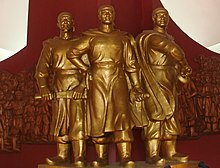Nguyễn Lữ
Nguyễn Lữ ( chữ Hán : 阮 侶; also Nguyễn Văn Lữ ; * around 1754; † end of 1787 ) was one of the leaders of the Tây Sơn rebellion alongside his brothers Nguyễn Nhạc and Nguyễn Huệ . From the end of 1786 he ruled as Đông Định Vương over the southernmost part of the Tây-Sơn empire . However, he had neither the statesmanship nor the military skills of his two brothers and was defeated a little later by Nguyễn Phúc Ánh .
Life
Nguyễn Lữ was one of three sons of Nguyễn Phi Phúc from the village of Tây Sơn in the South Vietnamese province of Quy Nhơn (Bình Định). He was about ten years younger than Nguyễn Nhạc and about the same age as Nguyễn Huệ. In his youth he lived as a Buddhist monk for some time .
Nguyễn Lữ first appeared independently at the beginning of 1776 when he led a naval expedition from Quy Nhơn to Gia Gnh (Saigon) on behalf of his older brother and conquered the city ruled by the Nguyễn princes . Numerous treasures and rice supplies could be captured; in addition, the enemy general Bùi Hữu Lễ was captured and killed. Nguyễn Nhạc took this success as an opportunity to proclaim himself king shortly afterwards. But only two months later, the Nguyon commander in Mỹ Tho , General Đỗ Thanh Nhơn , recaptured the city. Defeated, Nguyễn Lữ had to retreat to Quy Nhơn. The third brother Nguyễn Huệ then took over the military leadership. In the following campaigns, which led to the complete subjugation of the south, Nguyễn Lữ only had a subordinate command.
Instead, he oversaw the religious affairs of the Tây-Sơn state for the next few years, but was completely overshadowed by his two much more power-conscious brothers.
After Nguyễn Huệ had also conquered northern Vietnam in 1786, the brothers divided the empire among themselves towards the end of the year. Nguyễn Lữ received the extreme south with the capital Gia Định and assumed the title of ruler Đông Định Vương ("King of the Eastern Stabilization").
Despite the division, a civil war broke out a little later. Nguyễn Lữ supported Nguyễn Nhạc and sent his troops to the north, but they were defeated there by Nguyễn Huệ. Prince Nguyễn Phúc Ánh , who lived in exile in Siam , recognized the opportunity and returned to the Mekong Delta with some of his faithful in the summer of 1787 , where most of the local governors soon overflowed to him. Nguyễn Lu withdrew to Biên Hòa and instructed his general Phạm Văn Tham to defend Gia Định. The attack by the Nguy wurden was repulsed. The Nguyễn prince, however, had a letter forged in which Nguyễn Nhạc supposedly instructed his younger brother Lữ to have General Phạm Văn Tham executed for treason. The spy used as the mail carrier was arrested in Gia Định according to plan, so that the letter fell into the hands of the general. This wanted to refute the accusation of treason and went with some troops in the direction of Biên Hòa to Nguyễn Lu. As a sign of his willingness to negotiate, he waved a white flag . When Nguyễn Lu saw this, however, he assumed that Phạm Văn Tham had capitulated to the Nguyễn or even defected. His kingdom seemed lost to him; in panic he fled to Quy Nhơn. There he died humiliated at the end of the year at his brother's court, the cause of death being unknown. General Phạm Văn Tham was able to hold Gia Định for three quarters of a year; In early September 1788, the city finally fell to the Nguyễn.
Individual evidence
- ↑ KW Taylor : A History of the Vietnamese , Cambridge University Press, 2013, p. 369
- ^ Jean Chesneaux: The Vietnamese Nations: Contribution to a History , Current Book Distributors, Sydney 1966, p. 42
- ↑ KW Taylor: A History of the Vietnamese , Cambridge University Press, 2013, pp. 374–376
- ↑ Phút Tấn Nguyễn: A Modern History of Viet-nam (1802-1954) , Nhà sách Khai Trí, Saigon 1964, p. 65
| personal data | |
|---|---|
| SURNAME | Nguyễn Lữ |
| ALTERNATIVE NAMES | Nguyễn Văn Lữ; Đông Định Vương |
| BRIEF DESCRIPTION | Vietnamese rebel leader and king |
| DATE OF BIRTH | around 1754 |
| PLACE OF BIRTH | uncertain: Tây Sơn |
| DATE OF DEATH | Late 1787 |
| Place of death | at Quy Nhơn |
